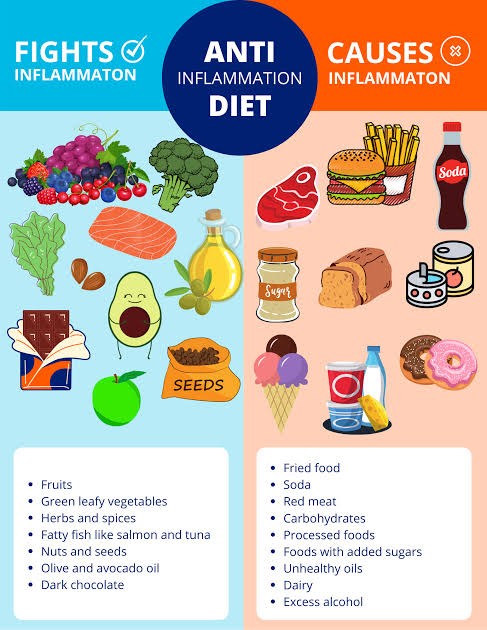
Nutritionist Karen Lamphere says, “Many diseases include a hidden cause associated with the presence of inflammation, such as arthritis, enteritis, asthma, allergies, heart disease, cancer, forgetfulness, and diabetes, and poor nutrition can cause an increase in the severity and severity of the disease.”
An anti-inflammatory diet provides a way to help patients relieve painful symptoms, heal and maintain health.
What is the anti-inflammatory diet?
Essential fatty acids. An anti-inflammatory diet includes healthy, unprocessed foods. Anti-inflammatory fatty acids are a cornerstone of this diet. Lamphere recommends eating foods rich in omega-3s, such as wild salmon, sardines, herring, anchovies, flaxseeds, and walnuts. In addition, other anti-inflammatory fats include olive oil, avocado oil, flaxseed oil, hempseed oil, and walnut oil.
Fruits and vegetables rich in inflammation-reducing antioxidants. Fruits and vegetables rich in antioxidants are important, especially onions, garlic, bell peppers and dark leafy greens. These foods are rich in carotenoids, vitamin K and anti-inflammatory vitamin E.
herbs and spices. It contains compounds that fight inflammation. Turmeric, oregano, rosemary, ginger and green tea contain bioflavonoids and polyphenols that reduce inflammation and limit the production of free radicals.
Some vegetables are more effective than others, such as pepper and spices derived from it, such as paprika. All peppers contain capsaicin (the more capsaicin the hotter the pepper), which is an effective neuropeptide blocker involved in inflammatory processes.
healthy protein. There is a difference between the ratio of saturated fats and omega-3s in grain-fed and grass-fed animals, the latter being a healthier choice for an anti-inflammatory diet. In addition, organic pasteurized eggs have better anti-inflammatory fats than farmed eggs. Choose your protein wisely and aim to reduce the amount of saturated fat in your diet






